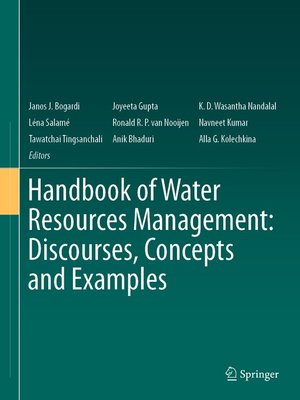Handbook of Water Resources Management
ebook ∣ Discourses, Concepts and Examples
By Janos J. Bogardi

Sign up to save your library
With an OverDrive account, you can save your favorite libraries for at-a-glance information about availability. Find out more about OverDrive accounts.
Find this title in Libby, the library reading app by OverDrive.



Search for a digital library with this title
Title found at these libraries:
| Library Name | Distance |
|---|---|
| Loading... |
This book provides an overview of facts, theories and methods from hydrology, geology, geophysics, law, ethics, economics, ecology, engineering, sociology, diplomacy and many other disciplines with relevance for concepts and practice of water resources management. It provides comprehensive, but also critical reading material for all communities involved in the ongoing water discourses and debates.
The book refers to case studies in the form of boxes, sections, or as entire chapters. They illustrate success stories, but also lessons to be remembered, to avoid repeating the same mistakes. Based on consolidated state-of-the-art knowledge, it has been conceived and written to attract a multidisciplinary audience.
The aim of this handbook is to facilitate understanding between the participants of the international water discourse and multi-level decision making processes. Knowing more about water, but also about concepts, methods and aspirations of different professional, disciplinary communities and stakeholders professionalizes the debate and enhances the decision making.
The book refers to case studies in the form of boxes, sections, or as entire chapters. They illustrate success stories, but also lessons to be remembered, to avoid repeating the same mistakes. Based on consolidated state-of-the-art knowledge, it has been conceived and written to attract a multidisciplinary audience.
The aim of this handbook is to facilitate understanding between the participants of the international water discourse and multi-level decision making processes. Knowing more about water, but also about concepts, methods and aspirations of different professional, disciplinary communities and stakeholders professionalizes the debate and enhances the decision making.






